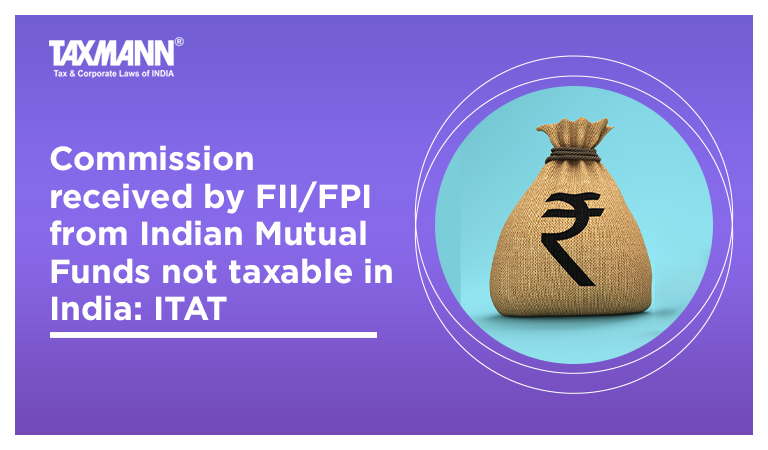Commission received by FII/FPI from Indian Mutual Funds not taxable in India: ITAT
- News|Blog|International Tax|
- 2 Min Read
- By Taxmann
- |
- Last Updated on 10 June, 2022

Case Details: DCIT v. Credit Suisse (Singapore) Ltd. - [2022] 139 taxmann.com 145 (Mumbai-Trib.)
Judiciary and Counsel Details
-
- Pramod Kumar, Vice-President & Sandeep Singh Karhail, Judicial Member
- Percy Pardiwala & Paras Savla for the Applicant.
- Milind Chavan, Sr. DR for the Respondent.
Facts of the Case
The assessee was a Singapore-based company incorporated under the Singapore companies act and registered as Foreign Institutional Investor (‘FII’) with the Securities and Exchange Board of India (‘SEBI’). It conducts portfolio investments in Indian securities in its capacity as SEBI registered FII/FPI.
During the year, the assessee and HDFC Asset Management Company had entered into an offshore Distribution agreement. As per the agreement, the assessee would create awareness about the scheme of funds, identify investors from amongst its clients, and procure subscriptions to units in the scheme of the funds.
Assessee earned offshore distribution commission income from HDFC Asset Management Company which was claimed as exempt under Article 12 of DTAA.
The Assessing Officer (AO) held that the assessee was operating as a distributor/lead manager of HDFC Mutual Fund, an Indian fund, which is controlled and regulated by SEBI and RBI in India. Thus, location control and management of the fund is situated in India, which constitutes a business connection in India. Accordingly, AO taxed the commission income under article 23 of DTAA read with section 5 of the Income-tax Act.
On appeal, the CIT(A) deleted the additions made by the AO. Aggrieved revenue filed the instant appeal before the Tribunal.
ITAT Held
The Tribunal held that section 5(2) provides that the total income of a non-resident person includes all income from whatever source derived, which is received or deemed to be received in India; or accrues or arises or is deemed to accrue or arise in India to the assessee.
Further, section 9 elaborates the expression “Income deemed to accrue or arise in India”. As per provision of Explanation 1(a) to section 9(1)(i), it is only that portion of the income which is ‘reasonably attributable’ to the operations carried out in India that shall be deemed to accrue or arise in India for the purpose of taxation.
AO sought to tax the offshore distribution commission income earned by the assessee by invoking the provisions of section 9(1)(i). To treat the income as deemed to accrue or arise in India, it is relevant that the said income should be ‘reasonably attributable’ to the operations carried out in India.
In the instant case, all the operations of the assessee were carried out outside India. In such circumstances, offshore distribution commission income cannot be treated as being ‘reasonably attributable’ to any operation carried out in India.
Further, the offshore distribution commission income of assessee was in the nature of ‘business income’ and such income could not be taxable in India in the absence of assessee’s permanent establishment in India.
Disclaimer: The content/information published on the website is only for general information of the user and shall not be construed as legal advice. While the Taxmann has exercised reasonable efforts to ensure the veracity of information/content published, Taxmann shall be under no liability in any manner whatsoever for incorrect information, if any.

Taxmann Publications has a dedicated in-house Research & Editorial Team. This team consists of a team of Chartered Accountants, Company Secretaries, and Lawyers. This team works under the guidance and supervision of editor-in-chief Mr Rakesh Bhargava.
The Research and Editorial Team is responsible for developing reliable and accurate content for the readers. The team follows the six-sigma approach to achieve the benchmark of zero error in its publications and research platforms. The team ensures that the following publication guidelines are thoroughly followed while developing the content:
- The statutory material is obtained only from the authorized and reliable sources
- All the latest developments in the judicial and legislative fields are covered
- Prepare the analytical write-ups on current, controversial, and important issues to help the readers to understand the concept and its implications
- Every content published by Taxmann is complete, accurate and lucid
- All evidence-based statements are supported with proper reference to Section, Circular No., Notification No. or citations
- The golden rules of grammar, style and consistency are thoroughly followed
- Font and size that’s easy to read and remain consistent across all imprint and digital publications are applied



 CA | CS | CMA
CA | CS | CMA
